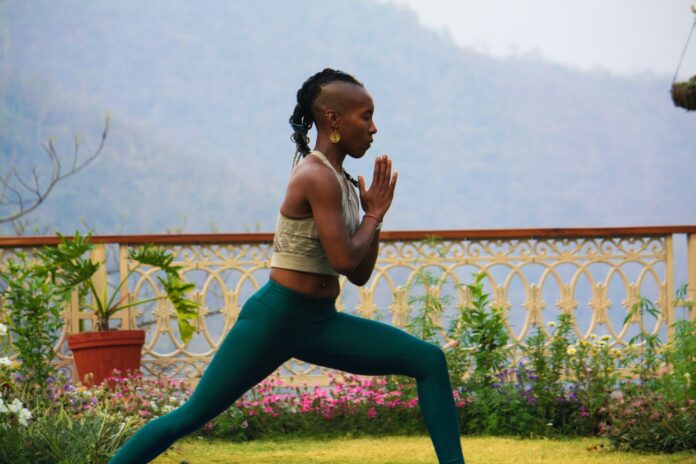
By TATYANA TURNER, The Baltimore Sun / Report For America
As Kendra Blackett-Dibinga headed to her yoga studio in Mount Vernon on the first day of the trial for the Minneapolis police officer charged with killing George Floyd, she spotted a Black man wearing a hoodie, emblazoned with big white letters: “I Can’t Breathe.” Those three words reinforced her purpose as a yoga instructor.
The Floyd case, along with a string of other police killings of Black people in 2020, sparked months of protests, and wound up becoming a call to yoga practitioners like Blackett-Dibinga.
She launched the “I Come to Breathe” campaign last fall at her studio, Bikram Yoga Works, which encourages its members to bring a friend or family member to live and virtual classes with free seven-day passes.
She and other yoga teachers and trainers across the country are tapping into the practice as a way to help Black people get a sense of reprieve during a time of isolation and civil unrest. Within the past year, teachers say they have seen an increasing number of Black men and women either practicing yoga or working to become instructors. In Philadelphia last fall, yoga teachers led sessions outdoors after protests. Other teachers have conducted classes to show people how to use yoga as a way to bring some healing to the community.
The Baltimore yoga studio’s campaign started after Blackett-Dibinga, 43, who is Black, took her three children to a George Floyd protest at a park in Washington, D.C., where they live. She was struck by the chorus of protesters repeatedly shouting “I Can’t Breathe!”
“I could not bring myself to chant that,” said Blackett-Dibinga, who decided that night to use her teaching to encourage people to meditate, reflect and breathe. “I believe you speak things to existence.” The “I Come to Breathe” message, and the free passes, spread beyond the region via the studio’s virtual platform.
Roughly 94% of people who practice yoga do so for wellness reasons such as lowering blood pressure and reducing heart rate, according to a recent study. “We need to breathe for the people who are oppressed and for the people who have COVID,” McAllister said.
In the months following the deaths of George Floyd, Breonna Taylor and other Black people killed in police encounters, the former first lady, Michelle Obama, shared on her podcast that she was experiencing “low grade” depression due to quarantine and racial tension. It’s a sentiment other Black Americans can relate to.
Vanessa Brown, 62, a retired Baltimore social worker who takes 12 classes a week at the yoga studio, said she appreciates the campaign because it is a time for empathy and understanding. Brown remembers the feeling of despair and isolation as a young Black girl, when riots against racism and police violence broke out in her hometown of Newark, New Jersey. For days, she couldn’t go any farther than her porch steps.
“My father was the only one who could go out and he had to have a pass,” Brown said. “The feeling of not being able to breathe has been throughout history.”
Veteran yoga instructors like Jana Long, who has practiced yoga for more than 50 years, said that although there are more Black people joining, yoga is not new to the Black community. “In mainstream culture, our history is not shown unless it’s civil unrest,” said Long, executive director of the Black Yoga Teachers Alliance in Baltimore.
She noted that civil rights activist Rosa Parks practiced yoga with her niece and nephew as a way of self-care, while Parks was living in Detroit. But Long said yoga is needed now more than ever. “We are in a moment where people need a practice that brings them to a place of inner peace and stillness,” she said.
Blackett-Dibinga plans to conduct a similar outdoor event in Washington this spring. “I want to show Black and brown communities that we are more powerful than we think we are,” she said.

